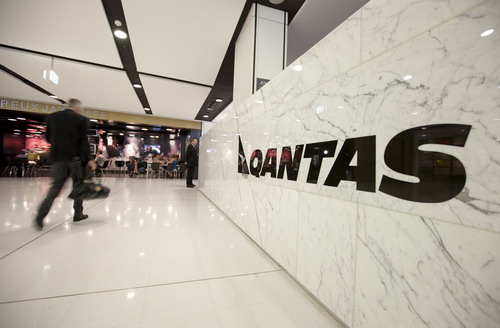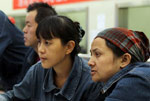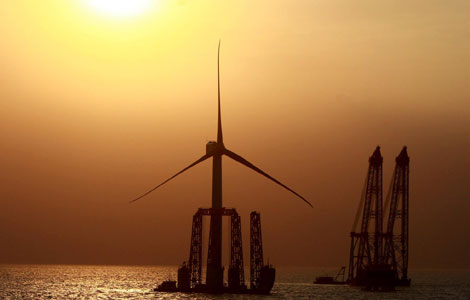Qantas wants to fly high in China
Updated: 2011-09-15 11:12
By Robert Fenner (China Daily)
|
|||||||||||
|
 The logo of Qantas Airways Ltd at the international terminal of an airport in Sydney. The Australian airliner plans to expand in China as part of its efforts to turn its international operations profitable. [Photo / Bloomberg] |
Australian airliner counts on five units to tap world's most populous market
SYDNEY - Qantas Airways Ltd, seeking to revive unprofitable international operations, is counting on five different airline units to win travelers in China, a market 60 times bigger than its home market of Australia.
The company is forming a premium carrier in Southeast Asia and a budget venture in Japan that will give it bases closer to China, CEO Alan Joyce said in an interview in Sydney on Sept 13.
The two new airlines, which will begin flights next year, will add to Qantas' operations in Vietnam, Singapore and Australia.
"There is a huge opportunity for Qantas within the Asian markets," Joyce said. Having premium and low-cost units serving China and the rest of the region is "critical", he said.
Winning sales in the world's most populous country is central to Joyce's plans to turn around overseas operations, which are losing about A$200 million ($207 million) a year because of competition from Middle East carriers on European routes.
Delta Air Lines Inc and American Airlines also added flights to China, where international air travel might grow 11 percent a year through 2014, according to the International Air Transport Association.
"I really think it is hard to overestimate China's potential," said Peter Harbison, chairman of the Sydney-based CAPA Center for Aviation, an industry adviser. The country's size and rising intra-Asia trade provide "unbelievable upside internationally", he said.
Qantas, Australia's largest airline, will order as many as 110 Airbus SAS A320s, including 78 of the revamped Neo version, to support the new Southeast Asia premium carrier and the Japan budget venture. It announced the new international airlines last month with plans to pare flights to Europe and shed 1,000 jobs in Australia.
The workforce cuts bolstered calls by unions for job security agreements, limiting the airline's ability to hire specialists, including pilots, for the new Asian carrier.
Qantas' long-haul pilots this year won regulatory approval for what would be their first strike since 1966, and engineers are implementing one-hour work stoppages until December.
BHP Billiton Ltd, the world's biggest mining company, has also had periodic strikes in Queensland since June amid disagreements with coking coal workers.
Australia's Labor government changed employment laws after coming to power in 2007, enabling more group-based agreements and implementing measures meant to stop any erosion of working conditions.
"A lot of businesses in Australia are very worried about the industrial relations challenge," Joyce said. "The union movement is emboldened and is very aggressive at the moment."
Still, the carrier might reach agreements with labor leaders by the end of the year, Joyce said. The engineers union said on Wednesday that it was unlikely that target would be met.
"Our problem is we need them to come to the table and talk to us about job security and what we can do," Peter Somerville, general manager of the Australian Licensed Aircraft Engineers Association, said on Wednesday. "Any agreement on these matters in the timeframe Alan Joyce gave is unlikely."
An accord with pilots will only be possible if Qantas guarantees that flights won't be outsourced to other companies, said Richard Woodward, vice-president of the Australian and International Pilots Association.
Qantas' low-cost budget arm Jetstar has led the company's growth in China by offering flights to eight cities from its hub in Singapore. The budget carrier's Vietnam unit also plans to add China flights, Joyce said.
The main Qantas airline flies to Shanghai and Hong Kong from Australia.
Chinese services represent more than 10 percent of Qantas' international revenue, compared with "low single digit" five years ago, Joyce said.
Qantas plans to decide whether to base its new premium airline in Singapore or Kuala Lumpur within two months, Joyce said. Singapore has the advantage of a bigger business travel base, while Kuala Lumpur might offer less competition and the chance to work with Malaysian Airline System Bhd and AirAsia Bhd, he said.
Like all of the company's overseas operations, Qantas will work with a local partner on the new premium unit to comply with international rules governing airline ownership. The Jetstar Japan venture will be partly owned by Japan Airlines Co and Mitsubishi Corp.













